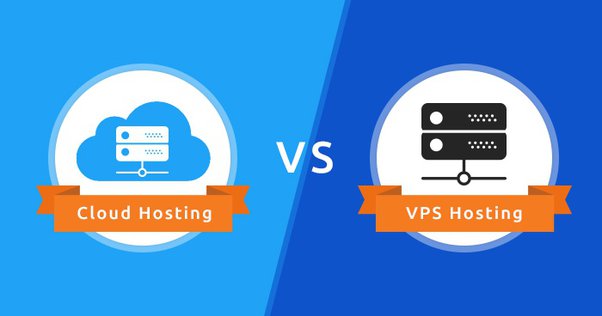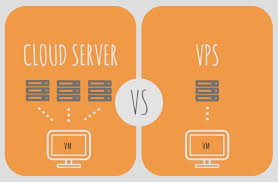Cloud Hosting vs VPS: A Comprehensive Guide to Making the Right Choice

In today's fast-changing, evolving digital verse, the capability for swift adaptation and scaling is crucial for digital presence. Opting for either Cloud Hosting or VPS (Virtual Private Server) Hosting highlights the significant influence that digital infrastructure has on charting the course for digital businesses.
This fundamental choice affects a website's efficiency and dependability, as well as its ability to expand and adjust in a constantly changing digital environment that does not allow stagnation.
Cloud Hosting, known for its unmatched ability to scale and vital dependability, is the ideal option for websites with variable traffic levels. Its design, which allocates resources over several servers, guarantees that an increase in traffic won't affect the quality of service.
This framework is naturally prepared to manage high-traffic periods, providing a sturdy foundation for businesses with unpredictable traffic flows or seasonal surges.
On the other hand, VPS Hosting presents an attractive option for those aiming for an equilibrium between affordability and functionality. By mimicking a dedicated server setting on a communal physical host, VPS hosting delivers dedicated resources and enhanced control over the hosting setup.
This arrangement is particularly suitable for businesses experiencing consistent traffic. The predictability of resource needs facilitates a customized hosting solution that merges the advantages of dedicated resources with the economic benefits of shared infrastructure.
Choosing between these two hosting models requires a comprehensive analysis of several important aspects, such as expected web traffic volume, the type of applications being hosted, scalability needs, budget limitations, and the technical expertise of the team in charge.

This in-depth assessment goes beyond technical details, exploring how each option could strategically affect a business's day-to-day operations and growth capacity.
Additionally, grasping the broader trends in web hosting, including the growing focus on sustainability and the emergence of AI and machine learning for managing and optimizing hosting environments, enhances the decision-making framework.
Cloud hosting, with its distributed nature, often aligns well with green computing initiatives, whereas the customization capabilities of VPS hosting can cater to specialized needs or compliance requirements.
In embarking on this journey to demystify the options of Cloud Hosting and VPS server, businesses stand to gain not just a hosting solution but a strategic asset that aligns with their long-term vision.
This is not another piece of research comparing features or prices; on the contrary, it is an exploration into one's business's future digital presence and a choice that may send this venture into the uncharted territory of growth and innovation.
If these hosting solutions were discussed in further detail, the business could make well-informed decisions that would help ensure the smooth operation of its online presence and thereby strengthen its position in the digital world.
Deciding between a cloud and VPS server, though, represents yet one more critical strategic decision. It implies a complete understanding of the technological framework and what best suits the business's needs and desires.
Cloud Hosting: Overview, Benefits, and Disadvantages

Cloud hosting represents a paradigm of disruption in web hosting. It leverages virtualization technology to pool resources from multiple physical servers into a cohesive, scalable hosting environment. This innovative approach allows websites and applications to be distributed across a network of interconnected servers, which collaborate to ensure high availability and superior performance.
The essence of cloud hosting lies in its flexibility and scalability, permitting an effortless scaling of resources such as CPU, RAM, and storage in response to the fluctuating demands of websites or applications. This adaptability makes cloud hosting an ideal solution for managing unpredictable workloads and maintaining optimal performance levels, thereby ensuring that websites remain accessible to users anytime and anywhere.
Cloud hosting's unique architecture, where resources for each website are replicated across every server in the cluster, offers unparalleled reliability. Even during instances of peak traffic or server malfunctions, cloud hosting maintains continuous operation by dynamically rerouting queries to other servers within the cluster, thus eliminating single points of failure and minimizing the risk of downtime.
Moreover, cloud hosting can be tailored to meet the diverse needs of customers through various configurations, from models resembling shared hosting environments, where resources on a cloud server are collectively utilized by all customers, to setups akin to Virtual Private Servers (VPS), offering customers exclusive access to specific system resources.
This flexibility in configuration underscores cloud hosting's capability to accommodate a wide range of hosting needs, from websites requiring a simple, shared resource pool to those necessitating dedicated resources for intensive operations. Cloud hosting technology's continuous evolution, coupled with its increasing adoption, signals a significant growth trajectory for cloud computing markets globally.
As companies become more aware of cloud hosting's strategic benefits, including improved performance, dependability, and the ability to scale, interest in cloud computing solutions is growing. This mirrors a broader shift towards more flexible, robust, and efficient web hosting solutions.
Benefits of Cloud Hosting

Cloud hosting offers a range of advantages, making it a favored option for businesses and developers looking for a strong, scalable, and economical web hosting solution. Essentially, cloud hosting delivers unmatched dependability; your website operates on a virtual segment that extends across several physical networks.
This arrangement ensures that the downfall of one server only slightly diminishes the total resource pool, leaving your website's access and performance unaffected. By spreading the workload over various physical units, such redundancy practically removes any single failure point, significantly boosting the hosting environment's dependability.
Additionally, cloud hosting stands out for its security, with its network of physical servers well-protected against unauthorized entries and disruptions. Its framework is built to secure your information from external intrusions and a variety of cyber threats, with ongoing security updates and management by the hosting service. This offers you tranquility and saves resources otherwise spent on securing a personal server.
A key advantage of cloud hosting is its scalability, providing a flexible hosting space that evolves according to your needs. It effortlessly supports traffic fluctuations and increasing storage needs by adding more servers or resources as required, all without downtime. This flexibility ensures that your site continues to operate smoothly, regardless of growth or sudden traffic spikes.

Cloud hosting's cost-effectiveness, with its pay-for-what-you-use pricing structure, makes it a smart choice for any business size. Whether your requirements are more aligned with shared hosting, VPS, or dedicated servers, cloud hosting can adjust to offer the needed resources at a price reflective of your actual usage.
Moreover, cloud hosting's extensible and flexible nature means that it does not bind to the limitations of single-server hosting. Resources can be accessed as needed and instantly, facilitating swift adjustments to support the growth and evolving requirements of your website without the need for extensive forecasting or excess capacity.
The ability to seamlessly adjust and scale resources without sacrificing performance or reliability underscores cloud hosting's suitability and efficiency for modern web hosting requirements.
Characterized by its dependability, safety, ability to scale, and cost-effectiveness, cloud hosting services offer a well-rounded approach that aligns with the evolving demands of the current digital era. Its increasing popularity underscores its effectiveness in delivering a versatile, secure, and efficient hosting setting, aiding companies in reaching their digital goals.
Disadvantages of Cloud Hosting

Although cloud hosting presents many benefits, it's wise to recognize some potential downsides that could impact your decision-making. Being aware of these drawbacks allows for better preparation and the ability to address possible obstacles.
Complexity and Clarity:
A notable drawback of cloud hosting is its intrinsic complexity. Its adaptability, enabling configurations akin to shared, VPS, or dedicated hosting setups, might also cause perplexity when choosing. This obscurity can pose difficulties, particularly for newcomers to cloud hosting, in pinpointing the ideal setup for their unique requirements.
Achieving the exact services needed requires a profound grasp of what's available and frequently entails in-depth conversations with providers to align expectations with actual outcomes.
Management and Technical Expertise:
Another challenge is the learning curve associated with managing a cloud hosting environment, particularly if you opt for an unmanaged service. Unlike more traditional hosting solutions that offer a straightforward control panel for administration, cloud hosting environments require a deeper understanding of cloud computing principles, networking, and server management.
This level of complexity indicates that organizations with a specialized IT team or those lacking in technical know-how might encounter operational challenges. Effective handling of a cloud setup demands technical insight as well as a continuous dedication to oversight, improvement, and safeguarding of the infrastructure, tasks that may overwhelm certain users.

Security and Compliance:
Although cloud hosting services typically come with robust security features, the collective nature of cloud platforms can introduce concerns regarding data privacy and adherence to regulatory requirements. Organizations that handle sensitive information or operate within tightly regulated sectors may find achieving compliance more complex in a cloud-hosting setting. Users often bear the responsibility for setting up and managing security protocols, particularly in scenarios of unmanaged cloud hosting, requiring keen awareness and technical know-how.
Cost Predictability:
Although the pay-as-you-go feature of cloud hosting is generally viewed as beneficial, it may also present challenges. For businesses experiencing variable traffic, this can lead to costs that fluctuate and are difficult to predict each month. Without careful management and monitoring, companies might experience bill shock from unexpected spikes in usage or services. Planning and budgeting become more challenging under this model, particularly for small businesses or startups that require stable and predictable operational costs.
Despite these challenges, which can be mainly addressed with thoughtful preparation, careful provider choice, and continuous oversight, cloud hosting continues to be an effective and adaptable option for a wide range of businesses.
Nonetheless, recognizing these potential limitations is essential for making a well-informed choice that matches your technical skills, business demands, and future strategic objectives.
VPS Hosting: Overview, Benefits and Disadvantages

Virtual Private Server (VPS) hosting sits comfortably in the middle of the hosting range, merging the cost-effectiveness of shared hosting with the customization and exclusive resources found in dedicated servers. This hosting type divides a single physical server into several virtual ones through virtualization technology.
Each virtual server is autonomous, equipped with its operating system, and allocated resources like CPU, memory, and storage space. This setup allows users to customize and control their hosting environment, fine-tuning it to individual needs and preferences.
VPS hosting is distinguished by its balance, appealing to a broad user base. It's particularly well-suited for websites and online platforms with medium to high traffic, as well as databases requiring more capabilities than what shared hosting offers but less than an entire dedicated server.
In a VPS setup, clients are guaranteed access to their VPS, which is complete with specific resources. This reduces the risks of resource conflicts and performance issues, which are prevalent in shared hosting scenarios.
VPS hosting stands out as the go-to choice for businesses and developers looking to step up from shared hosting due to increased traffic or the need for additional resources. It offers an isolated and secure environment, providing users with the confidence and versatility needed for effective online management.
Although VPS server is more complex than shared hosting, particularly regarding upkeep and management, it remains within reach for those possessing an intermediate level of tech know-how.
Benefits of VPS Hosting

VPS (Virtual Private Server) hosting is an ideal solution for business purposes and individual customers who seek quality shared hosting at the same time as server capabilities and independence resembling those of a dedicated server. The benefits of VPS hosting are many, primarily varied with the needs of web hosting, which include a mixture of efficiency, security, and numerous customization options.
Freedom and Control: A key benefit of a VPS server is the unmatched control it provides. Users have complete autonomy to oversee their server space, including root access for software installations and necessary adjustments. This autonomy covers every facet of server management, enabling a customized hosting experience designed to meet unique needs or desires.
Dedicated Resources: Unlike shared hosting, which allocates resources across various users, the VPS server offers exclusive resources for each virtual server. This arrangement gives your website exclusive access to a specified amount of CPU, RAM, storage, and bandwidth, guaranteeing stable performance unaffected by the activities of other websites on the same physical server. This allocation of dedicated resources markedly improves the performance and dependability of your hosting setup.
Enhanced Security: The VPS server provides an enhanced security level over shared hosting. Every VPS operates independently, ensuring that your information and files remain confidential and secure. This separation acts as a barrier, safeguarding your website against risks and security issues that may arise from other users on the same physical server. Moreover, the option to apply specific security protocols adds an extra layer of protection against possible dangers.
Scalability: A VPS server naturally allows for resource scaling, enabling straightforward adjustments in line with your website's expansion or fluctuating traffic. This scalability means you can increase or decrease resources according to need, offering the flexibility to adapt to changes in demand without the need for server migration or facing any downtime.
Cost-Effectiveness: While VPS hosting provides several advantages similar to those of dedicated servers, it is much cheaper. This cost-effectiveness makes it a compelling choice for companies searching for a powerful hosting solution without significant expense. The equilibrium between affordability and efficiency renders VPS server a practical option for websites aiming to upgrade from shared hosting yet not requiring the full capabilities of a dedicated server.
Offering a potent mix of efficiency, control, and security, VPS server is the go-to solution for websites needing more resources than shared hosting provides but without the comprehensive capabilities of a dedicated server. Its scalable setup and economical pricing structure make VPS server a versatile and dependable choice for various web projects, from growing blogs to high-traffic online stores.
Disadvantages of VPS hosting

VPS (Virtual Private Server) hosting, while offering many benefits, might not be the ideal solution in every case. Recognizing its possible drawbacks is crucial for an informed decision on hosting. Here are some of the limitations and considerations associated with VPS hosting:
Limited Scalability:
A fundamental limitation of a VPS server is its restricted scalability. Although adding extra resources like RAM, CPU, and storage to a VPS is feasible, the total capacity of the physical server naturally limits the scalability. Consequently, scaling up is limited. For websites or applications that are quickly growing, this constraint may require a switch to a more powerful hosting option, like a dedicated server or cloud hosting, to meet the increasing demand for resources.
Single Points of Failure:
Despite VPS hosting's strength, the physical hardware it relies on could become a solitary failure point. Should the physical server face problems—whether from hardware malfunctions, maintenance requirements, or other disruptions—each VPS on that server might suffer from downtime or reduced performance. This risk necessitates users to depend on their hosting provider's skill in handling these issues heavily and lessening them frequently via backup systems or swift repair measures, though their efficiency can differ.
Resource Contention:
Even though a VPS server provides dedicated resources, it's important to note that your setup still shares a physical server with other VPS users. In some instances, particularly when a hosting provider allocates server space or does not manage resources effectively, your website may suffer performance setbacks due to the actions of other users on the same server. This shared setting can cause resource conflicts, where the needs of one or several VPSs affect the resource availability for others, possibly resulting in longer load times or decreased performance at busy times.
Technical Complexity:
Handling a VPS demands some technical knowledge, particularly with unmanaged VPS hosting packages. Users must take on the tasks of setting up, securing, and upkeep of their virtual server, which can be a hurdle for those lacking the required technical abilities. This complexity may necessitate additional costs for technical staff or external support services, offsetting some of the cost advantages that the VPS server initially offered.
Cost Considerations:
While VPS servers are generally more affordable than dedicated hosting, they can also be more expensive than shared hosting options, especially considering the potential need for higher management and maintenance efforts. Businesses must evaluate their budget constraints and technical capabilities when considering a VPS, ensuring that the balance between performance needs and cost efficiency aligns with their objectives.
In conclusion, while VPS server provides a middle ground between shared and dedicated hosting with its blend of resource dedication and control, these potential disadvantages highlight the importance of carefully assessing your specific needs, growth expectations, and technical capacity before choosing this hosting type.
The Comparison between Cloud Hosting vs VPS

As we explore the intricate landscape of web hosting solutions, Cloud Hosting, and Virtual Private Server Hosting often stands out as the top choice for both businesses and developers.
These hosting options offer distinct advantages, features, and factors to consider, making the decision between them crucial for the operational effectiveness and growth potential of online projects. Before diving into the main differences and comparing the features of cloud hosting versus VPS, it's crucial to establish a baseline understanding of why this comparison matters.
Cloud Hosting is at the forefront of hosting solutions. It utilizes a vast network of linked servers to guarantee superior availability, scalability, and adaptability. It is engineered to manage varying web traffic, dynamically allocating resources as needed. This approach excels at maintaining high-performance levels, even with shifting workloads, offering a compelling choice for businesses experiencing significant traffic or rapid expansion.
On the flip side, VPS Hosting adopts a more conventional route. It segments a physical server into several virtual ones, each functioning autonomously with its set of resources. This arrangement grants users enhanced control over their hosting space, including choice of operating system and applications, plus the customization of server settings.
VPS hosting combines the affordability of shared hosting with the capabilities and autonomy of dedicated servers, appealing to businesses seeking a compromise between cost, efficiency, and expansion opportunities.
The upcoming comparison between Cloud Hosting and VPS will explore their essential distinctions in aspects such as Performance, Security, Scalability, Reliability, Flexibility, Pricing, and Support. This exploration is designed to highlight each hosting model's unique benefits and limitations, aiding users in making a well-rounded choice that fits their specific demands, technical capabilities, and strategic objectives.
Whether you prefer cloud hosting's unmatched scalability and flexibility or value VPS hosting's autonomy and cost efficiency, grasping each option's intricacies will enable you to select the hosting solution that best advances your digital footprint.
Key Differences

Delving further into the nuances of cloud hosting and VPS server, it's crucial to grasp the critical distinctions between the two options. Although both provide specific benefits suited to varied hosting requirements, they significantly differ in their framework, implementation, and oversight. Emphasizing these variances helps not only to outline the unique features of each but also to shed light on the reasons one may be favored over the other under certain conditions.
Resource Allocation and Management: Cloud hosting operates on a vast network of interconnected servers, ensuring resources are dynamically allocated based on demand. This fluid resource management model stands in contrast to VPS hosting, where resources are fixed to a particular portion of a physical server, providing a stable and predictable environment but with defined limits on scalability.
Infrastructure Dependence: The very architecture of cloud hosting offers redundancy and failover options inherently, as your hosting is not tied to a single physical server. Conversely, VPS server, while offering robust performance and control, is still dependent on the health of the underlying physical server, which can introduce a single point of failure.
Customization and Control: VPS hosting shines in offering users a high degree of control over their server environment, closely mirroring the experience of a dedicated server. This level of control is particularly appealing to users with specific requirements for software, configurations, or security. Cloud hosting, while flexible, typically offers less granularity in customization, prioritizing scalability and ease of management.
Pricing Structure: Cloud hosting's pay-as-you-go pricing structure matches its scalable features, ensuring that operational expenses directly mirror usage. Conversely, VPS hosting usually operates on a fixed pricing scheme, providing cost predictability but necessitating upfront resource estimation by users, who might end up paying for resources they don't use.
These core distinctions highlight the different principles guiding cloud and VPS servers, each tailored for particular scenarios. Cloud hosting shines in settings that demand scalability, adaptability, and robust backup options, perfect for businesses undergoing swift expansion or with variable traffic levels.
VPS hosting, which gives users a specific portion of a server, strikes a harmony between performance, management, and cost-effectiveness. It is ideal for those who prioritize these factors and have stable resource needs.
Features Comparison
The Comparison Table: Cloud Hosting vs VPS
| Feature | Cloud Hosting | VPS Hosting |
|---|---|---|
| Performance | Dynamically allocates resources for optimal performance. | Offers high, stable performance with dedicated resources. |
| Security | High security with multiple layers, but complexity requires careful management. | Highly secure; users must actively manage and implement additional security measures. |
| Scalability | Exceptionally scalable on-demand without physical limitations. | Scalable to a degree, but constrained by the physical server's limits. |
| Reliability | Highly reliable due to distributed architecture and automatic failover. | Generally reliable; dependent on the physical server and provider's redundancy measures. |
| Flexibility | Offers vast services and tools, with scalable resources. | Provides significant control over the server environment, with some physical limitations. |
| Pricing | Pay-as-you-go model can lead to variable costs. | Fixed monthly fee provides cost predictability. |
| Support | Typically includes extensive 24/7 support and maintenance. | Level and quality of support can vary by provider and plan. |
| Customization | Offers decent customization, though distributed nature can add complexity. | Highly customizable with root access, akin to a dedicated server environment. |
| Migration and Integration | Facilitates easy migration and seamless integration with a wide ecosystem. | Requires more technical effort for migration; supports robust integration with hands-on setup. |
After highlighting the primary distinctions between cloud hosting and VPS, we will review their attributes in detail. Each attribute is pivotal in selecting the most suitable hosting option for your needs, impacting not only your immediate online performance and security but also the sustainability and flexibility of your digital footprint over time.
In the upcoming sections, we will delve into how cloud hosting and VPS cater to these attributes, revealing each's advantages and possible drawbacks. The goal of this side-by-side review is to provide you with a thorough insight, helping you choose wisely based on your project's demands, financial limits, and growth plans.
Whether your emphasis is on the scalable, distributed nature of cloud hosting or the exclusive resources and customization potential of VPS, a deep dive into these characteristics will steer you towards a hosting service that most effectively furthers your goals.
Performance
Performance is a primary consideration when selecting a web hosting solution. It underpins your website's efficiency and user experience. Ensuring high-speed access, consistent uptime, and smooth functionality are essential to maintaining your online presence's credibility and user satisfaction.
Comparative Insight
The decision between cloud hosting and VPS depends on your website's unique requirements and traffic expectations. Cloud hosting shines in settings that demand extensive scalability and the capability to manage abrupt spikes in traffic, thanks to its decentralized structure, which provides unmatched flexibility and redundancy for quick adaptation to shifting needs. On the other hand, VPS server is noted for its steady and dependable performance. It provides a managed setting with exclusive resources, guaranteeing consistent performance, which is perfect for sites with steady traffic that nevertheless need high reliability and efficiency.
Security
Security is a crucial issue for any online entity, where safeguarding data's integrity and privacy is critical. The hosting service you select significantly contributes to your website's security foundation, enhancing overall web security measures.
Comparative Insight
Cloud hosting and VPS both provide strong security features, yet their methods and the level of responsibility required from the user vary. Cloud hosting is equipped with a multi-tiered security system maintained by the provider, designed to fend off a wide range of threats. This offers users ease of mind without the need for in-depth security oversight. On the flip side, VPS hosting grants users greater autonomy over their security settings, enabling tailored security solutions that cater to precise needs but also require more user engagement in managing security.
When it comes to security, the choice between cloud hosting and VPS hinges on a trade-off between having personal control over security measures and entrusting a provider with comprehensive security management. If managed aptly, both alternatives yield a secure hosting framework, with the decision mainly resting on the particular security demands, the technical know-how, and the capacity to oversee and execute security measures.

Scalability
Scalability is an essential attribute for any website, especially when digital content rapidly becomes popular and e-commerce platforms see seasonal increases in traffic. A web hosting plan's ability to adjust its scale is crucial for a website's functioning during peak periods, affecting user experience, sales, and general contentment.
Comparative Insight
Selecting cloud hosting or VPS hosting based on scalability needs hinges on your website's unique requirements. Cloud hosting excels in offering scalable resources on demand, perfect for sites with fluctuating traffic or those expanding. Conversely, VPS server is an economical choice for websites with stable traffic, providing a consistent setting with options for incremental growth.
Reliability
Reliability is a crucial foundation of web hosting. It guarantees that websites are consistently available and function at their best. It plays a vital role in preserving user trust and contentment since regular outages can significantly damage a website's credibility and its owner's financial outcomes.
Comparative Insight
Although cloud hosting and VPS hosting both aim to deliver strong reliability, cloud hosting's multi-server setup gives it an advantage in reducing downtime and more smoothly managing hardware issues. The automatic failover and load balancing features of cloud hosting also work to reduce the chance of service disruptions for websites.
On the other hand, because a VPS server depends on a single physical server, achieving comparable reliability might require the provider's and the user's extra effort. Opting for a VPS provider that provides solid backup and redundancy features is essential to boosting the reliability of websites hosted on a VPS.

Flexibility
In today's dynamic digital landscape, Flexibility stands out as a critical feature for web hosting. It determines how well a hosting solution can adapt to websites and applications' evolving needs. Flexibility encompasses not just the ability to scale resources but also access to a wide array of services, tools, and control over the hosting environment.
Comparative Insight
When evaluating Flexibility, cloud hosting emerges as the more adaptable option, especially for businesses that face rapidly changing demands or wish to leverage a broad suite of integrated services and technologies. Its on-demand scalability and comprehensive offerings provide an environment that can quickly adjust to digital needs' shifting landscape.
Conversely, VPS hosting offers a different kind of Flexibility — one that emphasizes control and customization over scalability. It's suited for users who require a dedicated environment with the freedom to configure their hosting space, albeit within the constraints of a physical server's capacity.
Pricing
Pricing structures in web hosting significantly impact decision-making for businesses and individuals alike, balancing budget constraints with performance and scalability requirements. Cloud hosting and VPS servers follow distinct pricing models, reflecting their respective service offerings and flexibility levels.
Comparative Insight
When evaluating the costs of cloud hosting versus VPS server, the decision usually hinges on your website or application's particular demands and financial constraints. Cloud hosting's pay-as-you-go approach delivers adaptability and may be more economical for sites with fluctuating traffic levels. On the other hand, VPS hosting's consistent monthly charges ensure price stability and tend to be more budget-friendly for sites with consistent resource needs.

Support
When evaluating web hosting options, the Support services provided by the hosting company are as critical as the technical features. Powerful support can be the linchpin for operational stability, offering peace of mind and ensuring quick resolution of any issues that arise.
Comparative Insight
In comparing Support services between cloud hosting and VPS hosting, the distinction often lies in the consistency and specialization of the support offered. Cloud hosting providers managing vast, multi-tenant environments typically have extensive support mechanisms in place, ensuring rapid and expert assistance. VPS server, while offering robust support, may present more variability in the level of personalized attention or speed of service, influenced by the provider's resources and the hosting package selected.
Ultimately, from a support perspective, the choice between cloud and VPS hosting should consider not only the availability of 24/7 assistance but also the quality, responsiveness, and comprehensiveness of the support services. Businesses and individuals must weigh these factors, potentially seeking reviews or testimonials, to gauge the reliability and effectiveness of a provider's support team.
Customization
Web hosting customization encompasses tailoring the hosting environment to specific needs, including choosing an operating system, server configurations, and software stack. This flexibility is crucial for website owners and developers who require specific settings to optimize their site's performance, security, and functionality.
Comparative Insight
When considering Customization, the choice between VPS and cloud hosting hinges on your website's specific needs and technical expertise. VPS servers offer a closer resemblance to a dedicated hosting environment, granting users extensive control over deep customizations within the boundaries of a single server's capabilities. On the other hand, cloud hosting provides a balance of customization and scalability. It is suited for users who need to adapt their hosting environment across a broader, distributed platform, albeit with potentially higher complexity in configuration management.
Migration and integration
Migration and Integration are crucial considerations when selecting a hosting solution. They directly impact the ease with which websites and applications can be transferred to the new environment and how well they integrate with existing tools and services. These factors are essential for businesses undergoing digital transformation or those looking to leverage a broad ecosystem of cloud services.
Comparative Insight
The choice between cloud hosting and VPS hosting, from the perspectives of Migration and Integration, hinges on the specific needs of the organization, the complexity of its digital assets, and the technical resources available. Cloud hosting offers a more streamlined and less resource-intensive approach, ideal for businesses looking for ease of migration and extensive integration capabilities within a broad ecosystem. VPS servers, on the other hand, provide a more controlled environment that can be tailored to precise specifications and are suited for organizations with technical expertise who want to manage a more hands-on migration and integration process.
In summary, understanding the requirements and constraints of migration and integration processes is essential when choosing between cloud and VPS hosting. Each option presents unique advantages that can align with different operational priorities, technical capabilities, and strategic goals.
Who Should use
Selecting the appropriate web hosting service is crucial for anyone aiming to build or expand their online footprint. Whether you are a solo blogger, a budding startup, or a sizable corporation, matching your hosting selection to your particular requirements—whether that's scalability, budget constraints, or technical oversight—is vital.
In navigating the decision between Cloud Hosting and VPS Hosting, understanding the unique advantages each offers and how they match your project's demands will ensure you opt for a platform that not only meets your immediate needs but also supports your aspirations for future growth.
This concise exploration aims to shed light on who stands to benefit most from each hosting type, simplifying your path to a well-informed decision.
Cloud Hosting
Cloud Hosting is perfectly customized for businesses and developers in need of the following:
-
Scalability: Cloud hosting's ability to dynamically scale resources up or down will benefit users expecting rapid growth or experiencing fluctuating traffic patterns.
-
Maximum Uptime and Dependability: For entities where constant availability is vital, like online stores and SaaS platforms, the backup and failover features of cloud hosting are indispensable.
-
Cutting-Edge Tech Compatibility: New ventures and technology firms that aim to utilize the latest advancements in AI, machine learning, and data analysis will value cloud environments' straightforward compatibility with innovative technologies and services.
-
Global Reach: Enterprises aiming to serve a global audience need the geographic spread that cloud providers offer, ensuring low latency and better performance worldwide.
-
Flexibility in Cost: Projects with variable budgets or those seeking to minimize upfront investments might prefer the pay-as-you-go pricing model that cloud hosting provides.
VPS Hosting
VPS Hosting is an excellent choice for users who prioritize:
-
Cost-Effective Solutions with Dedicated Resources: Small to medium-sized businesses (SMBs), bloggers, and developers on a budget who still need better performance than shared hosting can offer will find VPS servers attractive.
-
Control and Customization: VPS offers control for users with specific software configuration requirements who need root access to their server environment.
-
Stable Performance with Predictable Traffic: Websites that have outgrown shared hosting but have relatively stable traffic patterns will enjoy the dedicated resources and reliability of VPS without the necessity for rapid scalability.
-
Learning and Development: Individuals and organizations looking to build and test applications in a controlled environment will find a VPS's isolation and dedicated resources ideal for development and experimentation.
-
Security-Conscious Sites: Websites that handle sensitive transactions or data but may not yet have the scale to move to cloud hosting can enhance their data protection measures by utilizing VPS's dedicated resources and custom security setups.
What’s Best For My Website?
The answer lies in evaluating your website's specific needs against the backdrop of each hosting type's offerings:
Cloud hosting may be the preferred choice for growing businesses and dynamic websites with varying traffic that seek flexibility and scalability without compromising performance.
VPS hosting is a solid option for small to medium-sized projects with predictable traffic or for those who prioritize complete control over the hosting environment and a fixed cost.
Ultimately, the best choice is one that meets your current needs and aligns with your future growth trajectory and technical capabilities. Consider your operational requirements, budget constraints, and the level of technical management you're prepared to undertake.
Whether you choose cloud hosting for its scalability and innovation or a VPS server for its control and cost-effectiveness, ensuring your hosting solution aligns with your website's objectives is vital to fostering a robust online presence.
VPSServer is one of the best providers of Cloud Hosting and VPS Options that you have.

For those who've navigated the intricate details of cloud hosting and VPS, VPSServer emerges as a compelling choice. Our service extends across 20 global locations, leveraging the latest technology to deliver fast and secure hosting solutions. This global reach ensures your site is accessible and responsive to users worldwide, minimizing latency and enhancing user experience.
At the heart of VPSServer's offerings are cutting-edge technologies—from fast memory and modern CPUs like the powerful 2.7 GHz Intel Xeon Skylake processors to NvME SSDs. These components are meticulously selected to ensure your website not only meets but exceeds performance expectations.
Moreover, our platform capitalizes on the power of KVM virtualization and unlimited IOPS, presenting a superior Virtual Private Server (VPS) experience that is hard to match. Thanks to our robust infrastructure and technical prowess, VPSServer offers scalability, reliability, and performance.
Choosing VPSServer as your hosting provider means partnering with a company that prioritizes your online presence. Whether your project demands the elasticity of cloud hosting or the control and customization of VPS, VPSServer is equipped to support your growth at every turn, backed by unwavering customer support and technical excellence.
Frequently Asked Questions
What distinguishes cloud hosting from conventional web hosting services?
Cloud hosting operates on a network of interlinked servers, referred to as cloud servers, to host websites and applications, providing unmatched scalability, adaptability, and dependability. In contrast, conventional web hosting usually places your website on a solitary server. Cloud hosting is adept at managing abrupt increases in traffic and strives to keep your site operational with little to no downtime. Traditional hosting might struggle with scalability and performance issues.
How do I select the ideal cloud server hosting for my requirements?
Finding the right cloud hosting services means thoroughly examining their offerings, focusing on the flexibility of their cloud hosting plans, server performance, and the excellence of their customer service. Search for a service that offers a broad range of cloud hosting server options, robust security measures, and a proven track record to meet diverse hosting needs effectively.
Can you explain the benefits of using cloud servers to host my website?
Hosting your website on cloud servers brings a wealth of advantages, including increased scalability, making it simple to modify resources based on your site's traffic; enhanced reliability through cloud hosting's distributed approach, reducing downtime; and more flexibility, offering a selection of cloud hosting options tailored to your needs. Furthermore, working with a dependable cloud hosting provider grants you access to cutting-edge hosting technology and robust support for your digital footprint.
What criteria should guide my choice of a web hosting provider for superior service?
In your hunt for a web hosting provider, focus on ones that ensure a high-quality web hosting service, marked by assured uptime, extensive security protocols, and scalable hosting solutions that can expand with your enterprise. The perfect provider will offer prompt customer service, consistent backups, and easy-to-use management interfaces. Also, weigh the provider's standing, feedback from existing customers, the versatility of their hosting packages, and their capability to offer extra services like email hosting and domain registration, addressing all aspects of your online presence thoroughly.
What makes cloud hosting stand out for businesses experiencing rapid growth?
Cloud hosting is particularly beneficial for rapidly growing businesses due to its exceptional scalability. It allows for instant resource adjustment to accommodate increasing traffic, ensuring that a website remains operational and responsive during demand spikes. This adaptability is critical for businesses in expansion phases or those with fluctuating traffic volumes.
How does VPS hosting strike a balance between affordability and functionality?
A VPS server creates an environment akin to a dedicated server on a shared physical host, granting dedicated resources and enhanced control at a lower price than a dedicated server. This arrangement suits businesses with steady traffic well, delivering the benefits of dedicated resources alongside the economic advantages of shared infrastructure.
Can VPS hosting accommodate websites with stable but significant traffic?
Yes, a VPS server is especially suited for websites that have outgrown shared hosting and experience steady traffic. It offers a more isolated environment with guaranteed resources, ensuring stable and reliable performance without the need for the scalability provided by cloud hosting.
Why does managing a VPS demand more technical know-how than cloud hosting?
Handling a VPS necessitates a more profound knowledge of server administration, which involves setting up, securing, and upkeep of the virtual server. VPS hosting provides broad control and customization options, making it attractive to users with particular performance or security requirements. Conversely, cloud hosting often comes with managed services and automatic scaling, reducing the need for detailed technical management on the user's part.













